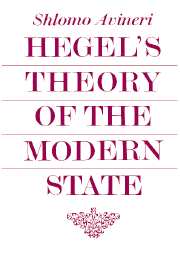Book contents
- Frontmatter
- Contents
- Title in the Series
- Preface
- 1 Beginnings
- 2 Positivity and Freedom
- 3 The Modernization of Germany
- 4 The New Era
- 5 Modern Life and Social Reality
- 6 The Owl of Minerva and the Critical Mind
- 7 The Political Economy of Modern Society
- 8 Social Classes, Representation and Pluralism
- 9 The State – the Consciousness of Freedom
- 10 War
- 11 The English Reform Bill – the Social Problem Again
- 12 History – the Progress towards the Consciousness of Freedom
- Epilogue
- Bibliography
- Index
5 - Modern Life and Social Reality
Published online by Cambridge University Press: 05 June 2012
- Frontmatter
- Contents
- Title in the Series
- Preface
- 1 Beginnings
- 2 Positivity and Freedom
- 3 The Modernization of Germany
- 4 The New Era
- 5 Modern Life and Social Reality
- 6 The Owl of Minerva and the Critical Mind
- 7 The Political Economy of Modern Society
- 8 Social Classes, Representation and Pluralism
- 9 The State – the Consciousness of Freedom
- 10 War
- 11 The English Reform Bill – the Social Problem Again
- 12 History – the Progress towards the Consciousness of Freedom
- Epilogue
- Bibliography
- Index
Summary
We have seen how Hegel's political writings present a consistent and progressively unfolding panorama of the way in which his political theory evolved through constant confrontation with historical reality. His systematic writings, on the other hand, reflect an attempt to develop the general theoretical framework within which his theory of the modern state could be defended.
Of all Hegel's systematic writings relating to political philosophy, the Philosophy of Right (1821) is the best known; it is also the only one which has been translated into English. Yet before his thought found its definitive expression in this work, Hegel had already attempted several times to systematize his thinking on political theory. It is these earlier versions of his mature political philosophy which show a remarkable continuity in the kind of questions Hegel was asking as well as in the general direction of his enquiry. Some of these earlier attempts also include detailed studies of issues which later would be merely summarized, or just hinted at, in the mature Philosophy of Right. These earlier attempts are thus indispensable for the understanding of Hegel's political philosophy both on their own merit and as the groundwork of his later thought.
Anyone going through these various attempts at a systematic treatment of political thought cannot but reach the conclusion that Hegel had not only been persistently preoccupied with the same set of problems, but that in a way he was also trying to write the same book all the time: we thus have before us early drafts, so to speak, of the Philosophy of Right.
- Type
- Chapter
- Information
- Hegel's Theory of the Modern State , pp. 81 - 114Publisher: Cambridge University PressPrint publication year: 1972
- 1
- Cited by

